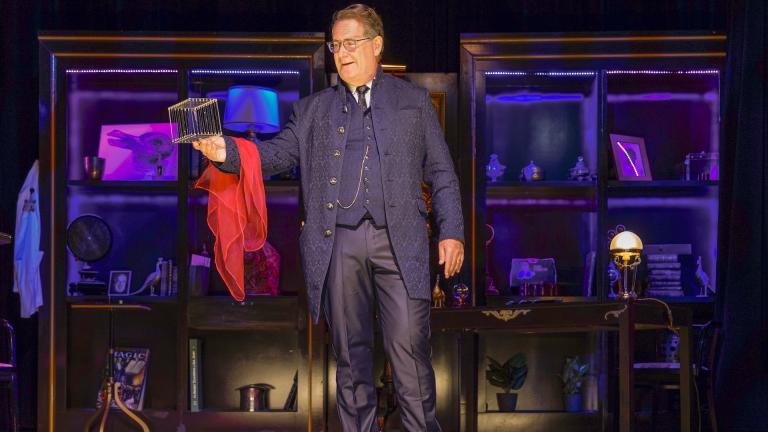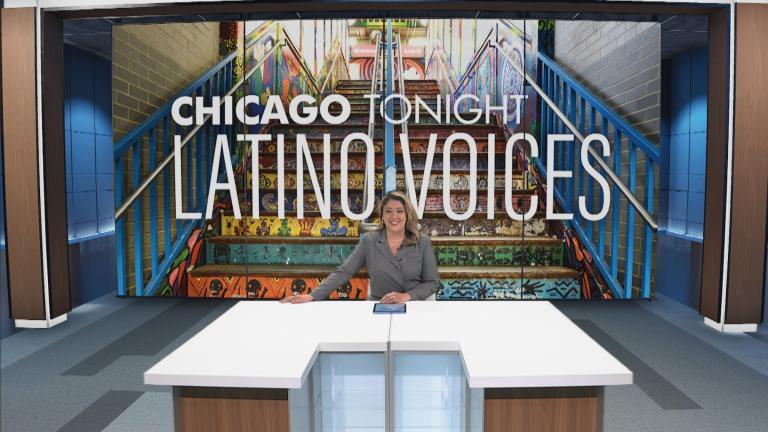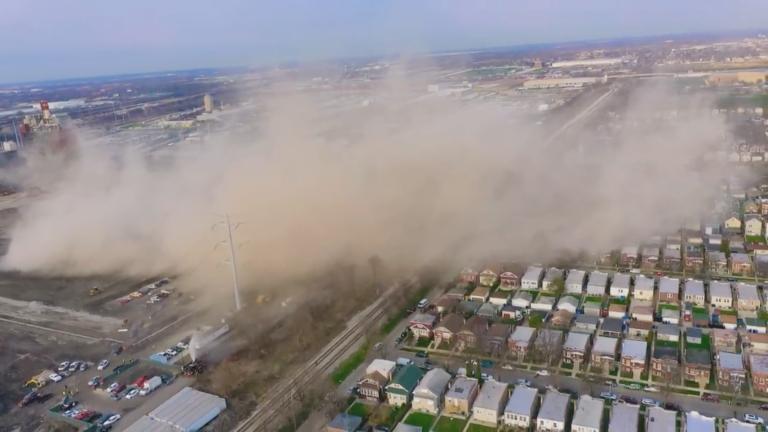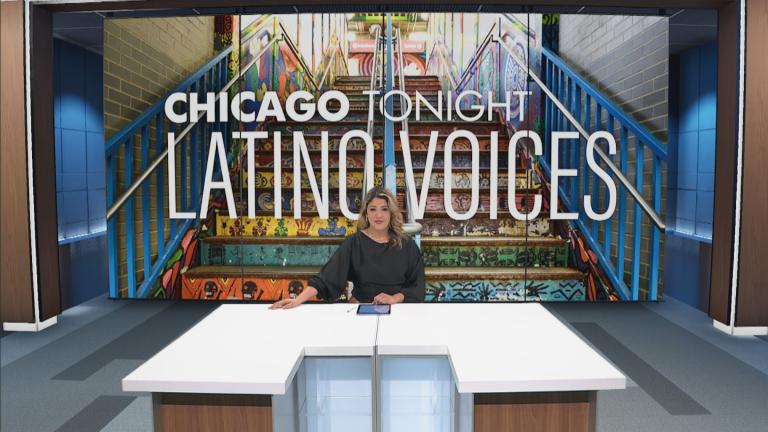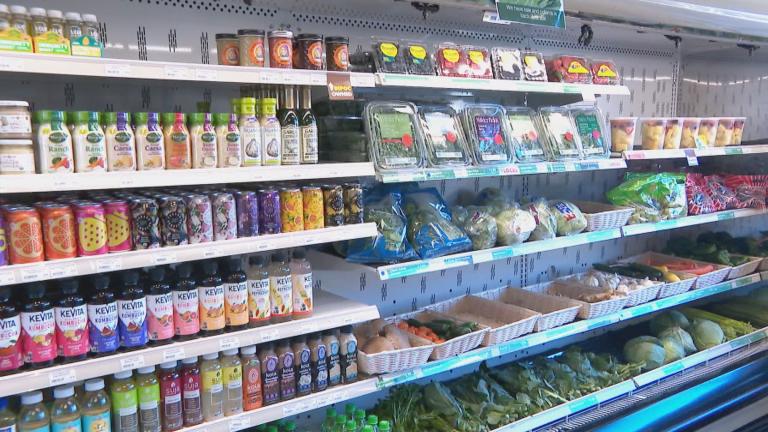When it comes to industrial pollution, it’s often Chicago’s Latino and Black communities who bear the brunt. Nowhere has that been more evident than Chicago’s Southeast Side.
After a two-year battle, environmental justice advocates fought metal shredding company General Iron and succeeded when the city denied the company a permit in their neighborhood. But in those communities, past industrial abuses still cast a shadow with the air, water, and soil pollution resulting in higher rates of asthma, cancer, lead poisoning and other health issues.
Isis Bazaldua co-founded Bridges//Puentes Justice Collective of the Southeast in 2020 and joined the coalition against General Iron. She said that the company’s history as well as her community’s history inspired her to activism.
General Iron was known to have two explosions of a metal shredder that they were planning to bring [in] — without fixing it — over to this community area and increase the industrial pollution that we currently have,” Bazaldua said. “In the community of the Southeast Side, we had a battle with petcoke and then a battle with S. H. Bell and then General Iron all within the span of two decades.”
Eduardo Flores, a member of Clean Power Lake County said that while industrial abuses are often thought of as an urban problem, pollution in Illinois extends beyond city limits.
“A lot of the issues that impact communities of color in Chicago are impacting communities all over the state, such as Waukegan, which is where we focus most of our work … It’s not just Chicago. And for us, sometimes it’s kind of hard because we have to make sure we’re speaking up so that we’re not forgotten,” Flores said. “We’re in Lake County where this pollution happens is the Waukegan north Chicago Zion area, whereas the rest of the county is more white predominant. And so we, the fact that we see all these issues concentrated in that Waukegan area, whereas the rest of the county doesn’t have to face these, we can directly see that communities of color, Hispanics’, Blacks’ communities, are affected.”
Cheryl Johnson, executive director of People for Community Recovery, is continuing the work her mother Hazel Johnson began demanding accountability for industrial pollution in the South Side Altgeld Gardens community. Hazel Johnson is often called the “mother of environmental justice” for the work she began in the 1980s, and Cheryl Johnson said while progress has been made, there is still a long road ahead.
“There’s been a lot of policies that has been implemented, but the problem comes in in their not being enforced. And that’s the biggest challenge that we have as local community is the enforcement and the opportunity to even know what’s going on in your community. The right to redress against industry coming in,” Johnson said. “We’ve been polluted since the 1860s … I live in public housing. I have a low income and the fact that my community is apolitical, and the land is cheap in my area defines if I’m going to live in a healthy community or not? Those are the inequities and just a bias that goes on with many of the industries and government, in this city, responsible for many of the environmental harms that we have to experience every day in our life. And that’s not fair.”
The fight for environmental justice is often portrayed as a battle between economic development and the environment, but Naomi Davis, founder and CEO of Blacks in Green, said there are ways industry and communities can live in harmony.
“We’ve been working at the intersection of environment and economy since we were born 15 years ago,” Davis said. “There is this new green economy with an aging infrastructure and so much pollution to be cleaned up, that means that there are decades of good paying green jobs enterprises that Black communities can be cultivating inside of our sustainable square mile where we believe that Black communities should be able to walk to work, walk to shops, walk to learn and walk to play.”
Davis sees the investment in the green economy and job as a good step, but also sees the need to ensure that those benefits and opportunities return to the community.
“We can have weatherization that is fundamental to even being able to enjoy some of these energy efficiency technologies, clean energy technologies — can’t have any of that with a leaky envelope,” she said. “Where are the roofers? Where’re the tuck pointers, where’re the air ducts sealers? All of these are a pipeline of workers and enterprises that we are cultivating because we can and because we must. But we deserve to have the financing, the funding, the trillions that are circling must be drawn down by the states and distributed equitably. And equitably in these terms means prioritizing Black and brown communities.
Isis Bazaldua said that beyond simply disallowing new industrial pollution, the companies responsible for past pollution must remediate the sites they damaged.
“We have land in the southeast side that is unusable, inhabitable and if we were to dig it up in any way would put more pollution than is safe [in the air], I believe that these companies need to find a way to clean the hazardous areas, that hazardous waste that they had put into this community, because it’s unfair to leave it on to the people who do not have these magnificent resources of income to clean up these areas and find a way to fix their wrongs,” Bazaldua said.
Eduardo Flores puts the responsibility for holding industry to account squarely on the shoulders of elected officials.
“The people who we elect in office are there to represent the people living in these communities. And they need to fight beside the committee members and fight against these corporations that will, if not stopped, they will literally try to do as much as they can to exploit,” Flores said. “And so the fact that these corporations can come in, make their money and then once they no longer want to or once they’re no longer profitable, they just leave our communities with the mess. The government needs to step in and enforce and ensure protect people’s backs and protect our communities.”

